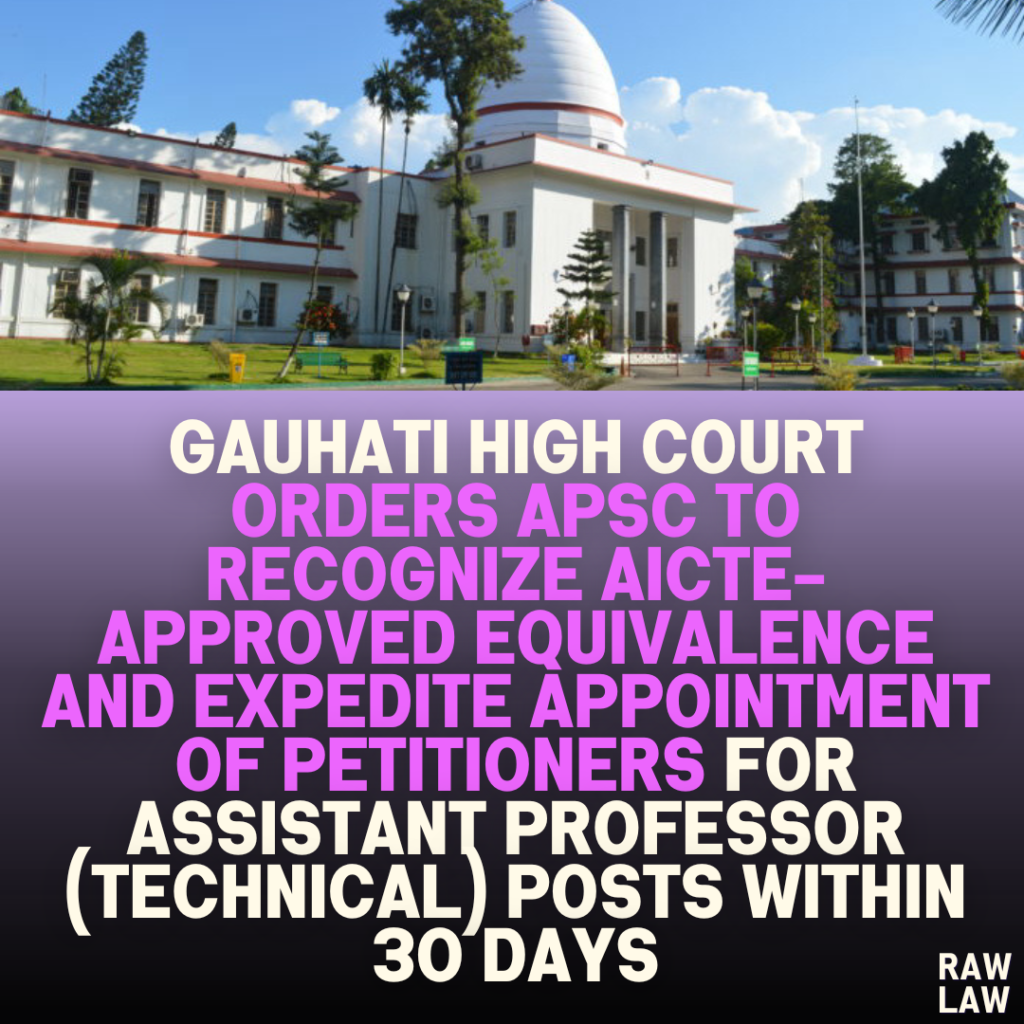Court’s Decision:
The Gauhati High Court allowed the petitioners to participate in the recruitment process for the posts of Assistant Professor (Technical) in various engineering colleges across Assam. The Court directed the Assam Public Service Commission (APSC) to proceed with declaring the results and making recommendations for appointments based on the petitioners’ merit positions in the final select list. This process should be completed within 30 days of the order’s receipt.
Facts of the Case:
The APSC had advertised for 66 positions of Assistant Professor (Technical) in various subjects for state engineering colleges in Assam on 25.05.2017. The petitioners applied but were excluded from the final list after a screening test. Initially, a writ petition was filed alleging that ineligible candidates had been included in the selection process, prompting the Court to permit the APSC to continue with the selection but with restricted publication of results until verification of candidate qualifications.
In response, APSC conducted multiple rounds of verification. However, a list issued on 27.06.2024 omitted the petitioners, who subsequently challenged this exclusion on the grounds that their qualifications were indeed equivalent as per the latest notification by the Government of Assam on 07.10.2024. This notification aligned with the AICTE’s stance on course equivalence, reaffirming the petitioners’ eligibility.
Issues:
- Whether the petitioners met the qualifications required for the Assistant Professor (Technical) posts as advertised.
- Whether the exclusion of the petitioners from the final interview list due to alleged non-equivalence of qualifications was justified.
Petitioner’s Arguments:
The petitioners argued that the latest notification by the Government of Assam on 07.10.2024 established that their qualifications were equivalent, as per AICTE standards. They claimed this clarification retroactively validated their qualifications for the positions advertised.
Respondent’s Arguments:
APSC, represented by its counsel, acknowledged that eligible petitioners who were included in the final select list following the interview would be entitled to appointments. However, it contended that relief should be limited to those who directly approached the Court through writ petitions, subject to their standing in the merit list.
Analysis of the Law:
The Court considered the scope of equivalence as determined by authoritative bodies, namely AICTE and the Government of Assam. It emphasized that APSC’s actions, though procedural, should be aligned with updated eligibility standards outlined by competent educational authorities.
Precedent Analysis:
The Court’s stance resonated with established judicial principles on procedural fairness, particularly in recruitment matters where candidate eligibility is affirmed by regulatory bodies. By validating the petitioners’ qualifications, the Court upheld precedents on ensuring non-discriminatory participation in public sector recruitment.
Court’s Reasoning:
The Court reasoned that since the AICTE, the apex body for technical education standards, had recognized the petitioners’ qualifications as equivalent before the advertisement’s issuance, there was no cause to exclude them from the recruitment process. The subsequent notification by the Government of Assam only served to reinforce this equivalence.
Conclusion:
The High Court concluded that APSC should allow the petitioners’ results to be declared and facilitate their appointments according to merit. The APSC was directed to expedite the recommendation process within 30 days.
Implications:
This judgment underscores the significance of adhering to the latest regulatory standards in determining candidate eligibility in public recruitment processes. The Court’s directive to honor verified qualifications supports equitable employment practices, emphasizing administrative accountability in recruitment processes.




Pingback: Bombay High Court Grants Interim Relief to Petitioner, Directs SFIO to Adhere to Working Hours for Senior Citizens’ Questioning, Emphasizes "Fairness and Reasonableness"; Suspends Coercive Steps Until Further Notice - Raw Law
Pingback: Jammu & Kashmir High Court Grants Anticipatory Bail in Rape and Cheating Case, Citing Complainant's "Inconsistent Statements and Retracted Allegations" - Raw Law